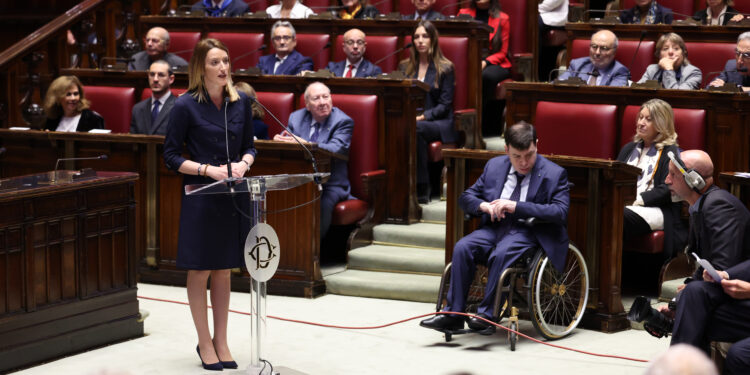Brussels – Support for Ukraine, common defense, and migration are the focus of European Parliament President Roberta Metsola‘s speech to commemorate the 70th anniversary of Alcide De Gasperi’s passing.
The foundation dedicated to the statesman invited Metsola to remember him at the celebration held today (Oct. 25) at the Chamber of Deputies in Rome, also attended by Italian President Sergio Mattarella.
The politics of Alcide De Gasperi, Metsola recalls, “were shaped by the experience of those who lived on the changing fault lines of empires.” As the last prime minister under the monarchy and the first of the republican phase, one of the fathers of the Christian Democracy party and the idea of the European Union, De Gasperi is for Italy and for Europe a “testament to the incredible potential of each individual to become an advocate for change,” Metsola said. He is remembered with Altiero Spinelli, Robert Schuman, Konrad Adenauer, Paul-Henri Spaak, and Johan Willem Beyen as one of the founding fathers of the European Union today.
“Seventy years ago, Alcide De Gasperi spoke about the future of our continent in a way that was rapidly changing,” Metsola begins, acknowledging the parallels with current changes in the international system. The current rifts include the Russian aggression on Ukraine on Feb. 24, 2022. The European Parliament president says she is “proud” of how the EU “united and supported our Ukrainian allies without hesitation.” She adds, “This is not just about Ukraine. This is about Europe.” The European Parliament recently approved a maxi-loan for Ukraine, which testifies and confirms the European commitment to the defense of the country led by Volodymyr Zelensky.
Related to this are the President’s words regarding the need to commit to “building a true Security and Defense Union that is complementary to NATO, without competing with it.” One of the projects that De Gasperi firmly supported during his long pro-European commitment was the European Defense Community, complementing the Coal and Steel Community along with the European Political Community. “These are not new ideas. De Gasperi and his generation stated these principles more than seven decades ago,” she confirms.
The last topic Mestola brought up is migration, which is currently hot in the European debate. “The Pact on Migration and Asylum, which we adopted earlier this year, after a decade of political impasse, offers a path forward,” Metsola said. Through “trust in our partners for the management of external borders,” it was possible to “eliminate controls within the European Union,” referring to the Schengen area. Precisely for this reason, she the need to work to “ensure that no member state, be it Italy or someone else, feels left alone to handle an issue that requires an authentic European approach.”
Metsola added that resources must be targeted to those in need, “intensifying repatriation of asylum seekers who do not qualify for protection and who can be returned quickly and safely.” Data from Eurostat on this issue confirm that Europe continues to struggle between theory and practice, with only one in four irregular migrants being repatriated.
“This is the time to make those decisions that ensure the prosperity of our union for generations to come,” Metsola continued, drawing lessons from De Gasperi. The EU is struggling, and European politics must represent “solutions and leadership.” Presiding over the only institution directly elected by citizens also entails living up to one’s mandate and the needs of Europeans. Metsola seems to have this clear in mind when she talks about addressing poverty, unemployment, or the European hyper-bureaucracy “that makes Europe seem distant and helps push people to the extreme political fringes.”
She concluded her speech expressing the hope that the Europe to be built in the coming years will reflect the one “imagined by Alcide De Gasperi: A Europe where borders do not limit ambitions, where cooperation leads to shared prosperity.” A desire that one hopes to see realized in future European policy choices for which Metsola and the institution she leads will also be responsible.
English version by the Translation Service of Withub




